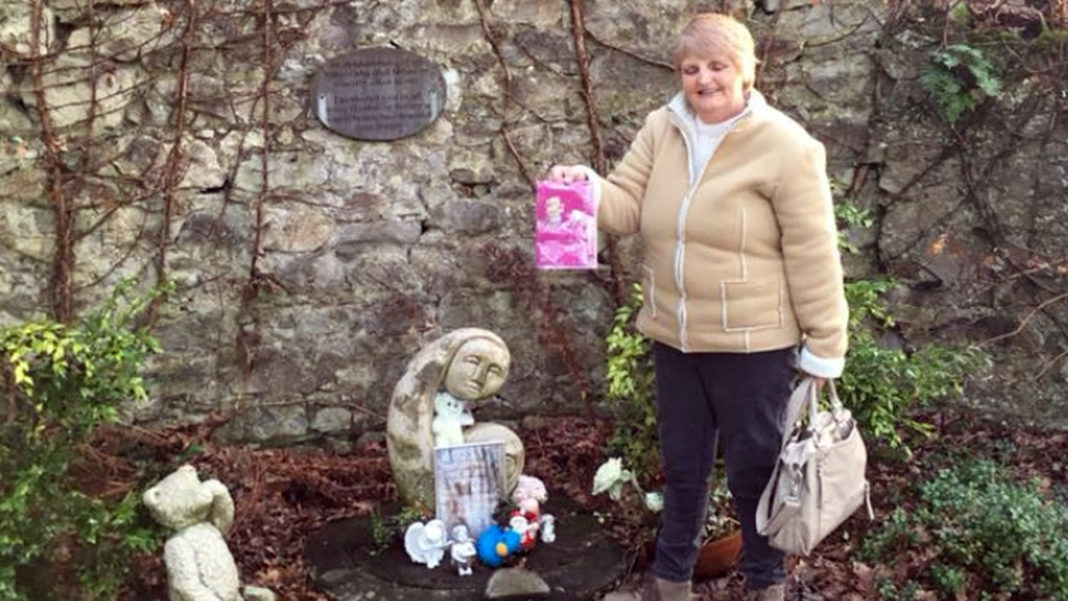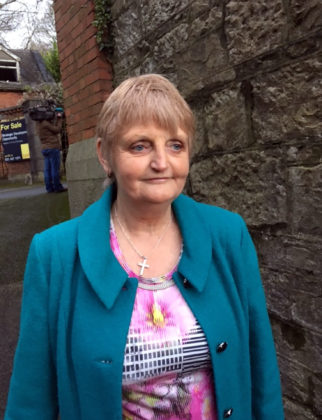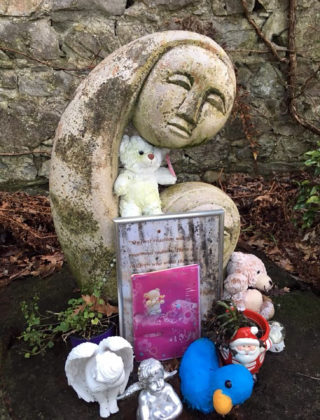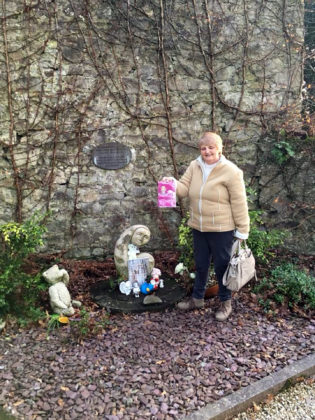Sheila was 19 when she was imprisoned in 1976 for the crime of 'falling pregnant'. She was enslaved and subjected to appalling cruelty, and her baby was stolen. Had not her Daddy rescued her from the prison to which he had sent her, she might never have been freed. Ireland can never apologise enough to women like Sheila, writes Donal O’Keeffe.
Last Saturday afternoon, Sheila O’Byrne made the long – and for a woman without a car, difficult – journey from her house on Blarney Street all the way across Cork City to the Angel plot, away to the back of vast grounds of the former Mother and Baby Home at Bessboro in Blackrock. It’s a pilgrimage Sheila makes as often as possible, and she leaves cards and toys to the memory of the countless children buried in that forlorn, horrible place. On her way home, Sheila stopped to buy new toys and colourful plastic flowers for her next visit. She feels it important that those children know they’re remembered and loved, and that somebody came back for them.
Sheila grew up in Dublin, and when she was 19, in 1976, she went to a dance with friends and visited their home. She says she was very innocent. “Nobody told us about the birds and the bees,” she says. When she found out she was pregnant “I was in shock. My Da idolized the ground I walked on, but he went mad.”
The Monsignor in Sandymount arranged for Sheila to be sent to stay with a family in Greystones. There she would be a skivvy and a child-minder, and when she had her baby, that baby would be taken. Sheila hated the way the family treated her, and she ran away. She had to walk the twenty miles – through 'fields and fields' – to her friend’s house in Clondalkin, where she collapsed in exhaustion.
From there, Sheila was sent – by her parents – to the St Patrick’s Mother and Baby Home on Dublin’s Navan Road.
“Where else had I to go?” asks Sheila. “I couldn’t go back home. There were no choices! Your family wouldn’t take you back. You were like a leper. A landlord wouldn’t take you in.
“You weren’t told that you had a right to keep your baby. They never told you. Just sign here.”
In St Patrick’s, Sheila was very good with children and she became great friends with one little girl called Joyce, maybe 15 months old.
“I can still see her little polka-dot white and navy dress,” Sheila says. “The nurse came in to take her away, and Joyce was screaming my name. And I watched Joyce go, and I was telling her ‘It’ll be alright, Joyce'.
“And the nurse said: "This’ll get you ready, Sheila, for when it’s your turn. Off you pop now, back to your work."
St Pat’s was cruel and relentless, Sheila says. “We worked from dawn till dusk, from seven in the morning straight through. The only time we got a break was for Mass on Sunday morning.”
Looking at photographs of St Patrick’s, Sheila points to the chapel, the residential section: “Look at the bars on the windows” – and “the reject ward” where disabled children were kept. “Bring that to the reject ward.”
When Sheila went into labour, she was told to 'walk around the grounds'. "I was lucky the sun was in my favour and it wasn’t raining. I was left on my own. I could have died.
“One nurse, a real villain, she said to me, ‘You’ll pay for your sins now.’
“The doctor had to be called, I was having difficulty. Forceps. I was lucky I didn’t die. There was no anaesthetic, no ante-natal care, nothing.”
When Sheila’s baby was born, she wasn’t allowed to touch him.
“The only time I was allowed touch my baby, the nurse brought him up into the chapel for his christening. Just to hold him in your arms once, and then he was taken. My Daddy gave me the money to pay for the christening. And then do you know what Mr Priest says?
“He said to me, ‘Well, Sheila, if you haven’t got the money, there’s other ways we can sort this out.’ And he reached over and he touched my left breast.
“I said ‘You’re alright, Father, I have my money. I’m paying in full.’
“And the nurse came straight in and took my baby off me. ‘Back to your work'."
Sheila’s father signed her out after a full year of the slavery into which he had signed her. “Only for my Daddy,” she says, “I’d never have got out.”
The last time Sheila saw her baby son, he was three months old. After Sheila had come home, she went to visit him in Sion Hill, in Blackrock. She wasn’t allowed to touch him.
“I said ‘I just came to say goodbye to you, and I hope everything will be alright. I can’t do anything'. I was in bits.
“When I came home, it was back to normal. Nothing was mentioned.”
She never married, never had any other children. “Not after what was done to me.”
Sheila keeps a replica of her old uniform, a white apron over a brown smock dress. She wore it at a demonstration in Tuam. Sheila has made it her life’s work to be a support to her fellow survivors. She says she’s outside Leinster House nearly every Friday for the Tuam Babies, and the Magdalene Laundry and Mother and Baby Home survivors.
Sheila moved to Cork 30 years ago, and she lives just up the road from the site of the former Good Shepherd Magdalene Laundry in Sunday’s Well. She is appalled at the notion that it might be concreted over for a 'Celtic Tiger-style' apartment block.
Sheila thinks a site of such cruelty needs to be redeemed by kindness, and she offers some ideas.
“I’d like to see flats for our Magdalene survivors, so they’re not living in squalor, or homeless. I’d also like to see a centre there, a training facility, and a museum of the experience of Magdalene survivors. And flats for the elderly and the homeless.”
Sheila has never sought, nor been offered, compensation.
Sheila makes the long journey to Bessboro to ensure the lost children in the grounds are remembered. We too as a people need to journey back to that awful chapter in our recent past that was the Magdalene, Mother and Baby and Industrial Schools complex.
The very least we can do is remember the victims and the survivors of an obscenely-wealthy abuse industry built on fear and shame, where women and children were enslaved and where healthy infants were stolen and sold, and sickly babies were left to die.
Surely we cannot allow their memory to be obscured in the name of a new housing development. As Sheila says, "you wouldn’t do it to the GPO!"











